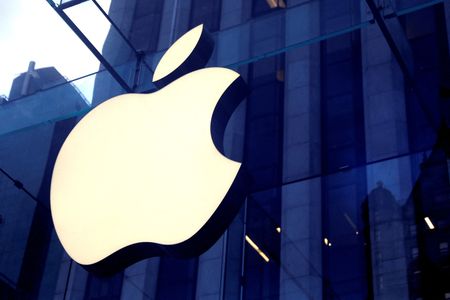
By Paresh Dave
OAKLAND, Calif. (Reuters) -Apple Inc is stifling competition through its mobile app store, attorneys general for 34 U.S. states and the District of Columbia said on Thursday, as they appealed against a ruling that let the iPhone maker continue some restrictive practices.
While dozens of state attorneys general have filed recent antitrust lawsuits against other big tech companies, including Facebook owner Meta Platforms Inc and Alphabet Inc’s Google, none had so far taken aim at Apple.
Thursday’s remarks, led by the state of Utah and joined by Colorado, Indiana, Texas and others, came in a lawsuit in an appeals court against app store fees and payment tools between “Fortnite” video game maker Epic Games and Apple.
“Apple’s conduct has harmed and is harming mobile app-developers and millions of citizens,” the states said.
“Meanwhile, Apple continues to monopolize app distribution and in-app payment solutions for iPhones, stifle competition, and amass supracompetitive profits within the almost trillion-dollar-a-year smartphone industry.”
The action comes after a U.S. district judge in Oakland, California, mostly ruled against Epic last year.
That decision found that commissions of 15% to 30% which Apple charges some app makers for use of an in-app payment system the company forced on them did not violate antitrust law.
Epic challenged the ruling in the 9th U.S. Circuit Court of Appeals. On Thursday, professors, activist groups and the states weighed in through court filings that described legal arguments in support.
Apple’s reply is expected in March. On Thursday, the company said it was optimistic that Epic’s challenge would fail.
The states said in their filing that the lower court erred by failing to adequately balance the pros and cons of Apple’s rules and also by deciding that a key antitrust law did not apply to non-negotiable contracts Apple makes developers sign.
“Paradoxically, firms with enough market power to unilaterally impose contracts would be protected from antitrust scrutiny — precisely the firms whose activities give the most cause for antitrust concern,” they said.
(Reporting by Paresh Dave; Editing by Clarence Fernandez)

